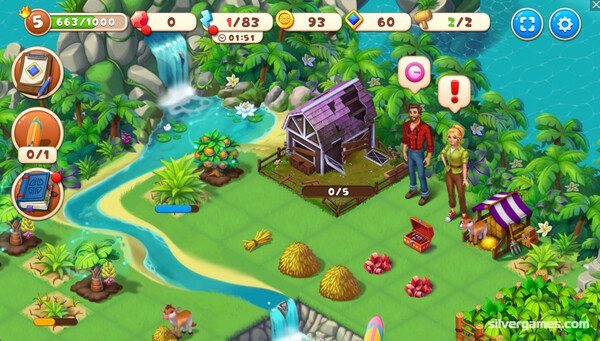Advertisement
Popular Now
Introduction
Tropical Merge is a popular mobile game that combines farming, resource management, and puzzle-solving in a tropical paradise setting. As players progress through the game, they encounter various challenges that require careful planning and strategic thinking. One of the most critical issues that players face is the resource bottleneck. This occurs when the demand for resources outpaces the player's ability to produce or acquire them, leading to a slowdown in progress and increased frustration. In this article, we will delve deeply into the resource bottleneck issue in Tropical Merge, exploring its causes, effects, and strategies to overcome it.The Basics of Resource Management in Tropical Merge
Before diving into the complexities of resource bottlenecks, it's essential to understand the basics of resource management in Tropical Merge. The game revolves around collecting and managing various resources such as wood, stone, food, and coins. These resources are used to build and upgrade structures, complete quests, and unlock new areas of the island. Each resource has a specific method of production or acquisition. For example, wood is gathered from trees, stone from rocks, and food from crops. Coins are earned through various in-game activities such as completing quests or selling surplus items. As players progress, the demand for these resources increases, requiring more efficient management and strategic planning.The Emergence of Resource Bottlenecks
As players advance through the game, they begin to encounter resource bottlenecks. This phenomenon typically occurs when the demand for a particular resource surpasses the player's ability to produce or acquire it. For example, players may find themselves in need of a large quantity of wood to upgrade a structure but lack the necessary trees to harvest it. Resource bottlenecks can manifest in several ways, such as depleted resource sources, long production times, or insufficient storage capacity. These bottlenecks can significantly slow down a player's progress and make it challenging to complete quests or unlock new areas of the game.Identifying the Causes of Resource Bottlenecks

Limited Resource Sources
One of the primary causes of resource bottlenecks is the limited availability of resource sources. In Tropical Merge, resources such as trees and rocks are finite, meaning that once they are harvested, they take time to regenerate. This limitation can lead to situations where players are unable to gather the necessary resources in a timely manner.Increased Demand for Resources
As players progress through the game, the demand for resources increases. Upgrading structures, completing quests, and unlocking new areas all require more significant amounts of resources. This increased demand can quickly outpace the player's production capabilities, leading to bottlenecks.The Impact of Resource Bottlenecks on Gameplay
Slowing Down Progress
The most immediate impact of a resource bottleneck is a slowdown in gameplay progress. Players may find themselves stuck on a particular quest or unable to upgrade a structure due to a lack of resources. This can be frustrating, especially for players who are eager to advance in the game.Increased Reliance on Microtransactions
Resource bottlenecks can also lead to an increased reliance on microtransactions. To overcome these bottlenecks, players may be tempted to spend real money on in-game currency or resource packs. While this can provide a temporary solution, it can also lead to a pay-to-win scenario where players who spend money have a significant advantage over those who do not.Strategies to Overcome Resource Bottlenecks
Efficient Resource Allocation
One of the most effective strategies for overcoming resource bottlenecks is efficient resource allocation. Players should prioritize their resource usage based on their immediate needs and long-term goals. For example, if a quest requires a specific resource, players should focus on gathering that resource first before using it for other purposes.Maximizing Resource Production
Players can also overcome resource bottlenecks by maximizing their resource production. This can be achieved by upgrading production structures, such as farms and mines, to increase their output. Additionally, players should make use of any available bonuses or boosts that can speed up production or increase resource yields.The Role of Storage Capacity in Resource Management
 Storage capacity plays a crucial role in resource management and can be a contributing factor to resource bottlenecks. In Tropical Merge, each resource has a maximum storage limit. Once this limit is reached, any additional resources gathered are wasted.
To avoid wasting resources, players should regularly upgrade their storage facilities. This will allow them to store more resources and reduce the likelihood of encountering bottlenecks. Additionally, players should keep an eye on their resource levels and use surplus resources before reaching the storage limit.
Storage capacity plays a crucial role in resource management and can be a contributing factor to resource bottlenecks. In Tropical Merge, each resource has a maximum storage limit. Once this limit is reached, any additional resources gathered are wasted.
To avoid wasting resources, players should regularly upgrade their storage facilities. This will allow them to store more resources and reduce the likelihood of encountering bottlenecks. Additionally, players should keep an eye on their resource levels and use surplus resources before reaching the storage limit.






















